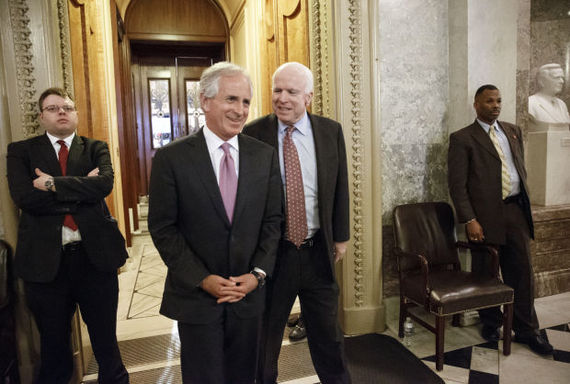You can call it a "wave," a "thumpin'," or a "shellacking," but whatever term that the pundits and politicians use, it's quite clear that the Republican Party made a loud statement on Election Night. White House Press Secretary Josh Earnest, DNC Chair Debbie Wasserman-Shultz, and President Obama himself will try to minimize the significance of the seven Senate-seat Republican pick-up on Tuesday night, but it's going to be difficult for the average American across the country to believe what they are spinning. Just like it was foolish for Americans to embrace the Bush administration line after their disastrous defeat at the polls in the 2006 midterms, it will be equally foolish to accept what White House officials will be saying about this week's election over the next several days.
Mitch McConnell, the three-decade, old-horse Republican politician from Kentucky who clung to his seat over Democratic challenger Alison Lundergan-Grimes, was all smiles on Tuesday night. Indeed, not only did he reclaim his Senate seat, but he is the overwhelming favorite for the position of Senate Majority Leader -- a post that McConnell has probably been eying since he was first elected to the Republican leadership. He was boastful on Tuesday night, but he also appeared to be cognizant of the reality that will smack him in the face come January: he is now responsible for assuring that Republicans can cooperate with an unpopular president that the party wishes would have been gone in 2012. "[T]he papers will say that I won this race. But the truth is, tonight we begin another one, one that's far more important than mine," McConnell said, "and that's the race to turn this country around, to restore hope and confidence and optimism across this Commonwealth and nation of ours."
Yet ironically, while McConnell may have been the big winner in this year's midterms, there are two other Senate Republicans who were given a tremendous amount of power. And neither of these two had to engage in a costly, time-consuming re-election campaign.
Tennessee Senator Bob Corker and Arizona Senator John McCain, two of the Obama administration's most vocal and persistent foreign policy critics, will now have the pleasure of moving into the big chair on their respective committees.
Outside of some unexpected shuffling combination, McCain moves from ranking member to chairman of the Senate Armed Services Committee -- one of the most powerful national security committees that the Congress has and the entity that is given the weighty task of negotiating the Pentagon budget, overseeing the Pentagon bureaucracy, and monitoring the use of the U.S. armed forces around the world. For a military and tactical junky like McCain, who has long relished being in the weeds of defense policy, this is a job that was tailored made for him.
Unfortunately for the White House, McCain has also been a constant thorn in the side of the president and his national security team. The veteran senator is the most outspoken member of the Senate chamber when it comes to foreign and defense policy issues, and he's not afraid to break the often consensual, friendly rules of the chamber to speak openly and honestly about what he feels (former White House Press Secretary Jay Carney was a victim of McCain's bull-headed attacks on live television this past summer). Republicans call McCain's antics genuine; the Obama White House would probably call them overly political. With McCain at the helm of Armed Services, Defense Secretary Chuck Hagel and Chairman of the Joint Chiefs General Martin Dempsey will now be even more susceptible to McCain's probing and aggressive questioning in front of the television cameras (McCain has called the administration's Syria policy "a disaster." At a time when the U.S. air war over Iraq and Syria is on everyone's radar in Washington, we can expect more hearings on the committee's docket about just these types of issues.
Bob Corker is almost the opposite of McCain in demeanor. Where McCain is loud and openly passionate, Corker is subdued and at times professorial. Corker, however, is also a frequent opponent of much of what the Obama White House is trying to accomplish around the world. During his time as ranking member of the Foreign Relations Committee, Corker has been especially prosecutorial on the administration's policies towards Syria and Ukraine -- in September, Corker co-authorized a bill that would place more stringent economic sanctions on Russia's economy; provide arms and military equipment to the Ukrainian military; and grant Ukraine, Georgia, and Moldova the status of a non-NATO member. Corker was also instrumental in prompting House Speaker John Boehner to extend an invitation to Ukrainian President Petro Poroshenko to speak at a joint session of Congress -- an honor bestowed only to the closest of U.S. allies.
Both men, McCain and Corker, will now be setting the agenda on the Armed Services and Foreign Relations committees. It's probably safe to assume that Defense Secretary Hagel, Secretary of State John Kerry, Chairman Dempsey, and their deputies will be making a lot more appearances than in the past.

